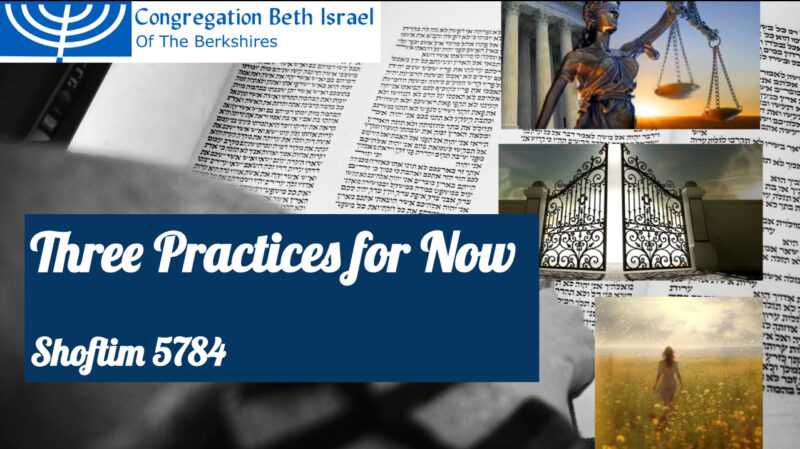I want to look at three verses from tonight’s Torah portion. One of them is big and systemic, while the other two are more intimate and personal. Each one suggests a spiritual practice to me – something we can actively make a practice of doing as we approach Rosh Hashanah.
צֶ֥דֶק צֶ֖דֶק תִּרְדֹּ֑ף לְמַ֤עַן תִּֽחְיֶה֙ וְיָרַשְׁתָּ֣ אֶת־הָאָ֔רֶץ אֲשֶׁר־יְהֹוָ֥ה אֱלֹהֶ֖יךָ נֹתֵ֥ן לָֽךְ׃
Justice, justice shall you pursue, that you may thrive and inherit the land that your God יהוה is giving you. (Deut. 16:20)
This verse is one of Torah’s profoundest messages. The repetition of the word tzedek, justice, might come to teach us to chase after justice both internally and externally, inside and out. Or maybe it means that we need to seek justice for others, and also for ourselves.
Ibn Ezra says the repetition means that we must pursue justice whether we ourselves win or lose. We must pursue justice because justice is what’s right – even if it doesnt benefit us personally. Justice matters, justice is precious and holy, even when we don’t ourselves win.
The American justice system is not perfect. There are wrongful convictions (which is why The Innocence Project exists). But I believe that justice, as an ideal, is one of the ways we live up to what’s best in us. And my time serving on a jury left me feeling humbled and moved.
“Jury service,” I wrote then, “asks us to do our best to root out any preconceptions or prejudice, and to approach everything we hear with an open mind. That’s a pretty good spiritual practice for anytime, honestly. So is holding deep empathy while also upholding accountability.”
I invite us to try to live in the world, between now and the holidays, as though we were serving on a jury and someone’s future is at stake. Notice our biases, and work to mitigate them. Approach everything with an open mind. Seek accountability from a place of deep empathy.
שֹׁפְטִ֣ים וְשֹֽׁטְרִ֗ים תִּֽתֶּן־לְךָ֙ בְּכל־שְׁעָרֶ֔יךָ אֲשֶׁ֨ר יְהֹוָ֧”ה אֱלֹהֶ֛יךָ נֹתֵ֥ן לְךָ֖ לִשְׁבָטֶ֑יךָ וְשָׁפְט֥וּ אֶת־הָעָ֖ם מִשְׁפַּט־צֶֽדֶק׃
You shall appoint magistrates and officials in your gates, in all the settlements that your God יהו’’ה is giving you, and they shall govern the people with due justice. (Deut. 16:18)
Appoint judges for your sh’arekha – your gates. For our mystics, this means not only the literal gates of our towns, but the “gates” into us. Our eyes, ears, nostrils, and mouth are seven gates that we need to guard in order to ensure the justice that this week’s parsha tells us to pursue.
What do we let in through these gates: what words do we read, what media do we consume? Whose stories do we seek out, and whose stories do we ignore? Where are we getting our news? Whose voices do we center? Whose voices do we ignore, or just… not want to hear?
And what do we let out through these gates? Are we careful with the words we speak? Do we repeat hearsay or gossip, or speak about others outside of their presence? Have our words caused harm this year? (The answer is yes, whether or not we can call instances to mind.)
I invite us to guard our gates as a spiritual practice this month. “The mind is like tofu: it takes on the flavor of whatever we soak it in,” said Reb Zalman z”l: whatever we let in these gates becomes our marinade. And whatever we let out of these gates shapes our impact on the world.
תָּמִ֣ים תִּֽהְיֶ֔ה עִ֖ם יְהֹוָ֥”ה אֱלֹהֶֽיךָ׃
You must be wholehearted with your God יהו’’ה. (Deut. 18:13)
During Elul, our mystics teach, “the King is in the Field.” Though sometimes tradition imagines God as a King, transcendent, unapproachable, this month we imagine God “descending” into creation and walking with us in the fields, a friend Who wants to hear what’s on our hearts.
This verse invites us to bring our whole hearts to God. Here’s my invitation: suspend whatever disbelief might be getting in the way. Take some quiet time this month – whether we’re out for a walk, or driving alone in the car – and speak aloud to God, as to a friend, what’s on our heart.
What are we worried about? What do we regret? What do we hope for? We might be surprised by what we hear ourselves say, or how it feels to hear ourselves say it. If we make a practice of this, between now and Rosh Hashanah, how might that deepen the holidays for us this year?
Three invitations:
Pursue justice by approaching the world with the integrity of a juror.
Guard our gates, mindful of what we’re taking in and what we’re putting into the world.
And pour out our hearts – not to the vast indifferent universe, but to an imagined beloved Friend.
Shabbat shalom.
This is the d’varling that Rabbi Rachel offered at Kabbalat Shabbat services (cross-posted to Velveteen Rabbi.)






